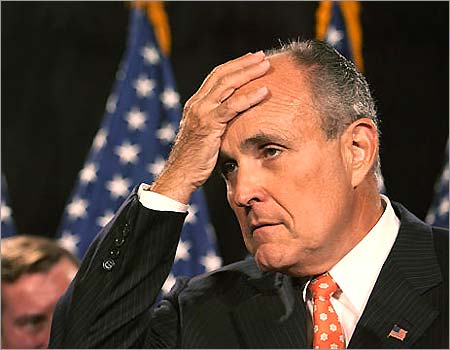Religion and politics are the most volatile of all topics, and for this reason, public etiquette has long demanded we avoid them in mixed company. So it’s rather unprecedented that our current presidential  candidates are fielding so many questions about — you guessed it — religion.
candidates are fielding so many questions about — you guessed it — religion.
During the May 3rd Republican debate, the candidates were asked whether they believe in evolution. Mitt Romney, a Mormon, was asked whether Catholic bishops should deny Communion to parishioners who support abortion rights, and Mike Huckabee, a Baptist minister, was asked whether he thinks the Mormon governor governed “Mormonly” enough. CNN framed it this way: Debate Evolves into Religious Discussion.
In a recent forum on Faith, Values, and Poverty, candidates on the other side of the aisle fielded similar questions. In an article entitled Democrats Take Religion Out of the Closet, Sojourners described the proceedings:
John Edwards spoke of his “belief in Christ” and said “it was the Lord that got me through” the death of his son.
Barack Obama said religion taught us to be “our brother’s keeper, our sister’s keeper.”
Hillary Rodham Clinton said she was not sure how she would have handled her husband’s public infidelity “without my faith. And, you know,” she added, “I take my faith very seriously and very personally.”
When it comes to politics, the words “personal” and “faith” have been inseparably wed. We don’t care what one believes, as long as they keep it personal and know how to run the country. A generation ago, when Ronald Reagan, Bob Dole and George H.W. Bush were vying for the GOP presidential nomination,  no one was asking about the “personal faith” of the candidates. But things have changed.
no one was asking about the “personal faith” of the candidates. But things have changed.
Why?
I can’t help but believe the media is finally getting it. Statistics regularly show that Americans are deeply religious. And this is reflected in our presidential candidates. There are no atheists running for president. Coincidence? In fact, the majority of them claim some form of Judeo-Christian belief. Coincidence? The two exceptions — and maybe extremes — would be Dennis Kucinich (a mystical mosaic) and Mitt Romney (a Mormon). In this, the candidates accurately reflect Americans. Perhaps the secular media — and the candidates — are finally conceding what we have known all along.
But I think there’s another reason for the shift. The notion that faith can be “compartmentalized” — or to use the buzzword, “personalized” — has been niggling at our psyche for the longest. Of course, beliefs are “personal” in the sense they are arrived at, adhered to, and embraced differently. But, however different our beliefs, they cannot NOT affect us personally.
What one believes cannot be detached from how one governs, acts, makes love, makes war or makes policy. Faith might be “personal” but it will inevitably affect our “person.” Unless of course, that faith is phony, a photo op, or a plank to placate our constituency. In which case, that too will become evident.
The discussion about faith and religion is important because one’s religion influences one’s politics. Plain and simple. To suggest someone’s “personal faith” does not have social and political implications is a fallacy.















Mike, I would like to believe it is as you say. But, the cynic in me believes that this is just a ploy by the leftist media.
They know that the republican base is largely composed of the religious right. They know that the democratic candidates will give the pat answer and say that “there faith is important to them and deeply personal”. This is a non-threatening position. They believe that this will – through triangulation – appeal to the christian democrats and keep them home despite the liberal social postitions of the democratic candidates.
What they really want to do is ask only the republicans these questions hoping that the republicans will “go too far” and actually discuss their relationship with Christ. This will have a two-fold effect.
First, said republicans will alienate “most americans who although believe in God are far more tolerant than us crazy Christians.”
Second, the same press can then rip on the republicans – accusing them of letting their pastor make their decisions for them or ruling through visions or mis-interpretations of the Bible.
Mike, interesting thoughts, but I think the political world is like a big chess game; I wonder if religion is just a (excuse the pun) Bishop and religious anecdotes are just Pawns… all trying to scheme about to take down the other guy’s King. But, maybe not… maybe quotes from W. Bush like, “My faith plays a big part in my life…” are true… God help us.
Dayle… “a ploy by the leftist media”… please.
I also distrust the religious talk of the left. IT’s a strategy. That doesn’t mean I trust all the religion talk on the right, either. 🙂 I think politicians know that some voters want to hear God talk.
What talks is how they vote. If they vote like Christians (or whatever religion they have), then I believe their God talk. If I see that they take religious teaching into account in their platform, then I believe it.
And I think BOTH sides should talk about their faith, but I wish I could trust that the Dems were not just pulling it out to hook Christian voters.
I would add that the personal compartmentalization is bullshit. Which is why when someone says, “Well, I think abortion is a bad thing, but, hey, who am I to tell someone else not to have one?” Um, isn’t that what we’re supposed to do if we are convicted a thing is evil, wicked, not clear in our conscience? Fight against it? Whether it’s racism, ripping off the elderly, hunger..if we think a thing should not exist, we shouldn’t say, “Well, who am I to tell someone not to berate a person of a different race, or who am I to tell a person not to tery to get every penny they legally can off a senile old person?” No, if we think it’s wrong, we battle against it. And should.
And if they really think God and faith are personal, then as the feminists said loudly decades ago, the queer activists echo still, “The personal is political.”
Then the pesonal religious is political.
Mir
Isn’t it unbiblical to say my Christian faith is private? I have a personal relationship with Christ, but that relationship should be evident. What happened to sharing the gospel? The great commission?
When a politician says that his faith is a private matter, I translate it this way:
I’m not really a Christian, but I don’t want to say that because I want the evangelical vote. So, I will go to church and pretend and those dumb simple-minded Christians will never figure it out.
If he says it’s private, then it’s conveniently off-limits to public scrutiny.
I pretty much distrust the words “I’m a Christian” spoken by anyone I can’t look at and confirm it. Unfortunately, most of the politicians I’ve seen have nothing better to say about themselves than “I’m not the other guy.” Yeah. That makes me want to vote for you.
Yes, it is unbiblical to say “My faith is private.”
Or is it for nothing it’s written “Faith without works is dead”?
Even the demons in hell believe God is, and that Jesus is the Christ.
You’re not suggesting that an atheist wouldn’t make a good president are you Mike?
Thanks for the lively feedback. While faith, in a biblical sense, must be applied and personalized to be genuine, there are lots of levels of maturity. So in theory, a person can have genuine faith and (1) Not be applying it or (2) Not be applying it biblically. So while I think it is wrong to portray faith as totally subjective, it’s probably also wrong to be quick to judge a person’s faith because of (1) Absence of fruit or (2) Rotten fruit. I’ve gone through times, as a believer, where I’ve had both. We should probably give professing politicians the same courtesy.
I believe a dynamic is created by the current media-driven political framework that makes it impossible to authenticate everything to everyone. Kind of like Remade said, “I pretty much distrust the words ‘I’m a Christian’ spoken by anyone I can’t look at and confirm it.” I’m not sure I’d use the word “distrust,” but my sentiment is the same. The primary reason we must inherently “distrust” or be non-committal toward politicians (and media personalities / celebrities in general) claiming faith is that we just don’t have enough intimate, first-hand knowledge of a person to validate their faith. Compound this with the Scriptural admonitions concerning false Christs, unsound doctrine and being discerning, and there’s good reason to be cautious about politician / celebrity faith-claims.
But one of the primary reasons I mistrust — or am skeptical of — politicians, is the nature of their profession. They need votes to stay in office. Bottom line. This doesn’t mean that all politicians lack integrity, but that the very nature of their business demands they modulate their message to various groups. Call it what you want: diplomacy, savvy, or lying. As T-Bone Burnett said in his song I Can Explain Everything , “When you’re talking to that many people at one time, You’ve gotta be lying to somebody sometime.”
GerM, just as there are many fine atheists, I’m sure there could be a fine atheist president. However, our nation’s historical roots and current religious makeup suggest that atheism might be a hard sell. After all, we want someone in the White House who, at least, marginally resembles us. And as long as we remain predominantly “religious,” an atheist president will be a stretch.
My qualms about voting for an atheist candidate would be three-fold: 1.)Atheism has no real basis, other than evolving social norms, for an ethical / moral platform; 2.) Many issues that are important to me (like abortion) are fundamentally linked to one’s views about human life and its origins; 3.)Without the acknowledgment of a Higher Power, any power (i.e. authority) is volatile.
After 9/11, our representatives broke out in a spontaneous chorus of God Bless America for good reason. What song would an atheist president have sung?
I thought this was interesting because just the other night I went out with one of my Catholic girlfriends for dinner (and a couple too many drinks). Faith came up and she said, “I have a lot of faith. It’s part of who I am, but it doesn’t affect my life. I don’t use it as a crutch to get through the day. It’s just part of me.” I think a lot of people feel that way.
Anyone can claim to be a Christian. I really think we should just stop judging people by what they say about their faith, and look at their life. It’s so easy to claim faith in something. If it’s a politician, look at their voting history and how they conduct themselves. Some people don’t like to talk about their faith publicly, but live it every day. It doesn’t make them any less Christian. Their life is their witness. I’d love to see more public figures actually living out what they believe, instead of claiming Christ with their mouth and living like there’s no God at all.